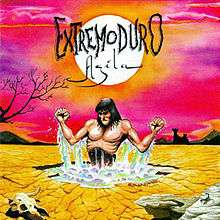Agila (album)
Agila (Spanish dialect Castúo[1] for "Liven up")[2] is the sixth studio album by Spanish hard rock band Extremoduro. Recorded in 1995, produced by Iñaki "Uoho" Antón and released on 23 February 1996.[3]
It's often considered as their breakthrough album. Published in 1996, a year after its preceding album, Pedrá, it featured instruments that hadn't appeared before on any of Extremoduro's albums. It includes some of the most famous songs by the band: "So payaso", "Buscando una luna", "Prometeo", "Sucede" and "El día de la bestia", which was included on the movie of the same name soundtrack.
Track listing
| 1. |
"Buscando una Luna" | Roberto Iniesta |
4:13 |
| 2. |
"Prometeo" | Roberto Iniesta |
3:29 |
| 3. |
"Sucede" | Roberto Iniesta |
3:09 |
| 4. |
"So Payaso" | Roberto Iniesta |
4:43 |
| 5. |
"El Día de la Bestia" | Roberto Iniesta |
4:46 |
| 6. |
"Tomás" | Roberto Iniesta |
1:29 |
| 7. |
"¡Qué Sonrisa Tan Rara!" | Roberto Iniesta |
3:18 |
| 8. |
"Cabezabajo" | Roberto Iniesta |
3:42 |
| 9. |
"Ábreme el Pecho y Registra" | Roberto Iniesta |
3:32 |
| 10. |
"Todos Me Dicen" | Roberto Iniesta |
4:13 |
| 11. |
"Correcaminos, Estate al Loro" | Roberto Iniesta / Ramone |
2:34 |
| 12. |
"La Carrera" | Roberto Iniesta / Zosi Pascual |
2:18 |
| 13. |
"Me Estoy Quitando" | Tabletom |
2:12 |
- 2011 edition bonus tracks
| 14. |
"Sucede (Nueva Mezcla 2004)" | Roberto Iniesta |
3:05 |
Personnel
- Extremoduro
- Roberto "Robe" Iniesta – vocals; acoustic and electric guitars; keyboards on #10
- Iñaki "Milindris" Setién – guitars except on #04, 09, 12, 13
- Ramón "Mon" Sogas – bass except on #04, 07, 09, 13
- Alberto "Capi" Gil – drums except on #04, 05, 09, 13
- Additional personnel
- Iñaki "Uoho" Antón – guitars except on 06, 07, 09, 10, 13; bass on #04, 07, 09; keyboards on #01, 05, 10; piano on #04; hammond organ on #11; percussion on #02, 03, 08, 11, 14
- Fito Cabrales – spanish guitar on #06; 13; cajón on #13
- Albert Pla – vocals on #07
- José Sañudo – saxophone on #01, 02, 03, 06, 08, 10, 14; flute on #13
- Sergio (Ratanera) – drums on #04, 09
- Pepegu (Ratanera) – bass on #04, 09
- Isaac (Ratanera) – guitars on #04, 09
- Sime – trombone on #04
- "Reverendo" – hammond organ on #06
- Josu Monje – programming on #05; drums on #05
- Elena – chorus on #05
Charts and certifications
Chart performance
Certifications
Reception
Rolling Stone magazine referred to it as a masterpiece of the Spanish rock.[6]
In 2007 it was ranked by American magazine Al Borde as the 227th best rock en español album of all time,[7] a position likely to be relatively low because at the time of the album's release the band was still unknown to Latin America.[8]
In 2012 was ranked as the 12th best album of the Spanish rock according to Rolling Stone.[9] Agila reached 300,000 copies sold.[9]
The track "So payaso" was ranked as the 103rd best song of the rock en español ever by the magazine Al borde,[10] in addition to winning the award for best music video of the Spanish Music Awards in 1997.[11] Likewise, it was included as DLC in the video game Guitar Hero III: Legends of Rock.[12]
References
External links
|
|---|
|
- William
- Kaíto
- Salo
- Luis "Von Fanta"
- Carlos "el sucio"
- Eugenio "Uge"
- Miguel Ferreras
- Jorge "el Moja"
- Ramón "Mon" Sogas
- Iñaki "Milindris" Setién
- Alberto "Capi" Gil
- Diego Garay
| | | Studio albums | |
|---|
| | Live albums | |
|---|
| | Compilations | |
|---|
| | Singles |
- "Tango suicida"
- "¡Qué borde era mi valle!"
|
|---|
| | Promo singles |
- "Extremaydura / La hoguera"
- "Decidí / Jesucristo García"
- "Tu corazón"
- "Quemando tus recuerdos"
- "Sol de invierno"
- "Ama, ama, ama y ensancha el alma"
- "Estoy muy bien / Los tengo todos"
- "Pepe Botika ¿Dónde están mis amigos?"
- "Pedrá"
- "Buscando una luna"
- "So payaso"
- "Sucede"
- "Amor castúo"
- "Salir"
- "Golfa"
- "Golfa / Autorretrato"
- "A fuego"
- "Standby"
- "No me calientes que me hundo"
|
|---|
| | Videos and DVDs | |
|---|
| | Box sets | |
|---|
| | Other albums |
- Como Animales
- Robe, mi Pequeña Historia
- Maquetas 90
- Desidia
- La Hoguera
- Canciones sin Voz
|
|---|
| | Related artists | |
|---|
|
